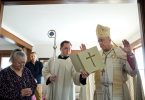by Joe Bollig
joe.bollig@theleaven.org
KANSAS CITY, Kan. — Advances in medicine have produced unprecedented capabilities in providing medical care. But they’ve also produced unprecedented ethical dilemmas.
Should the family end hydration and nutrition for a loved one?
Should dialysis continue?
Should organs be donated — how and when?
Should the ventilator or feeding tube be removed?
What documents should — and shouldn’t — be signed?
What is proportionate care?
To help Catholics facing these and other difficult decisions, Archbishop Joseph F. Naumann has created the Archdiocesan Ethics Advisory Council.
The 14-member group was established to provide expert advice to the archbishop in the areas of ethics, especially medical ethics. Its first meeting was on May 28.
“The archdiocese has a joint ethics committee that serves three medical institutions — Villa St. Francis, Santa Marta, and Catholic Community Hospice,” said Father Gary Pennings, vicar general and a member of the council.
“And that committee deals primarily with ethical issues with those three agencies,” he continued. “However, the archbishop wanted a larger body to advise him on other ethical [issues] and, in particular, medical ethical issues.”
New technologies and new challenges are constantly arising, and people seek the church’s guidance.
“The archbishop knows the theological side, but he needed some people who work in the medical and ethical fields to advise him on some practical issues as he exercises his teaching office,” he said.
The council’s members include doctors of various specialties, attorneys, religious, health care providers, clergy and persons with other useful expertise and experience.
The council’s chairman is Dr. Pat Herrick, a family practice physician with Associates in Family Care of Olathe. He is a member of Prince of Peace Parish in Olathe.
Of particular concern are the kinds of documents that Catholics are confronted with when they or a loved one is sick.
Sometimes, they’re presented with documents during a crisis and simply sign things they don’t fully understand. Even in nonemergency situations, the documents can seem confusing or complicated.
“I can tell you from personal experience that good and faithful Catholics face some rather agonizing decisions, and they’re getting conflicting advice,” said Dr. Austin Welsh, a member of the Erickson Health Medical Group in Overland Park and a council member.
“Often a hospital says, ‘We can’t care for your loved one,’ and there are cost issues involved,” continued Walsh, a member of the Latin Mass Community of St. Philippine Duchesne, Westwood. “So, the archbishop and the priests are the ones who very often have to advise parishioners with those difficult decisions.”
For the time being, the council will restrict itself to broad policy concerns and not deal with individual cases except for study purposes.
“It might use an anonymous case for internal training, to do a case study to wrestle with issues,” said Father Pennings. “But normally not. That would be something for the joint ethics committee to deal with, the [individual ethical] cases that would arise at those institutions. The council looks at the larger picture, the more theoretical, and then also helping in formation of Catholics in the area of medical ethics.”







Good morning members. I am a board member for a crisis pregnancy center (Options for Women) here in central Minnesota. I try to keep up on all things being published with regard to marriage and family. Would you be able to help me access a copy of the study commissioned by Archbishop Joseph Naumann on the health risks to women using hormonal contraceptives? Thank you in advance for your assistance.
Sincerely, Gerard A. Becker